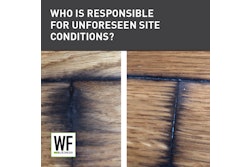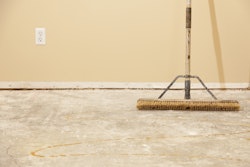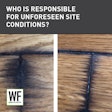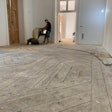Roger owns a sanding and finishing business, and Jerry owns a large contracting business that does hardwood flooring installation, sanding and finishing. One night after work, the two traded horror stories about their jobs. Roger described the time his crew messed up a sanding job at a clothing store and he was legally required to redo all the work. Jerry was appalled, because he had a similar situation with a prefinished Brazilian cherry floor in a shoe store, but in addition to replacing the flooring, he also had to pay damages to the store owner when the store was closed longer than expected. The difference between these two situations—and why Jerry had to pay so much more— depended on a series of laws called the Unifor m Commercial Code (UCC).
Sale or Service?
As a contractor, do you consider your services as primarily the sale of hardwood flooring or as the installation of that flooring? Most likely, you provide both in the same sale to the customer. More than likely, you've never considered what the consequences of one or the other might be. When you give a homeowner an estimate, the price probably includes the cost of the product itself, a fee for installation, sanding and finishing, and a profit. As long as everything goes smoothly—the product has no defects, there are no installation errors, and you get paid—everybody is happy and life goes on. But what happens if you install the flooring incorrectly? What happens if the flooring is defective?
To understand the distinction, first know that all sales or service arrangements are a contract. You agree to provide the homeowners with hardwood flooring, and in return, they agree to pay you a certain price. Regardless of whether it's in writing, it is a contract.
Buyers' Advantage
In many states, if the transaction between you and the homeowner is viewed primarily as a sale (where you provide flooring to the homeowner) rather than as a service (you install the flooring), then the transaction is governed by the UCC, which gives more protection to the buyer in the event something goes wrong.
To determine whether the transaction is predominantly service-oriented or goods-oriented, a court considers the cost of the flooring versus the cost of installing the flooring, the volume of the flooring, the number of individuals installing the flooring and other factors. For instance, if you provide a simple glue-down installation for premium prefinished flooring, the contract would be considered a sale. If the homeowner already purchased the material and you're in charge of installing, sanding and finishing it, then the contract is service-based.
Understanding Warranties
The UCC provides "express" and "implied" warranties to buyers. Express warranties can be the written warranty that either a seller of the flooring or the manufacturer might provide. However, they also include promises, descriptions or affirmations the contractor verbally makes to the buyer.
Express warranties are created when you assert a fact or make a promise about the flooring that becomes part of the reason why the homeowners decide to buy that flooring. An express warranty would also be created when there is a description of the flooring that's part of the basis of the sale or when a sample is part of the basis of the sale. You don't necessarily need to use the words "warranty" or "guarantee" or even have the intention of making a warranty, but if you say the flooring the homeowner requested can be installed over radiant heat, and that's the reason the homeowner buys that product, then you made an express warranty, whether you wanted to or not. Another example would be if you provide the homeowner with sample boards stained the color the homeowner wants. That sample becomes the reason the homeowner agrees to the purchase, so you are providing an express warranty that the floor will closely resemble that sample.
An implied warranty is given to buyers in most hardwood flooring sales—you are implying that the product you are selling is suitable as flooring, and the buyer is relying on your skill or judgment to select suitable goods.
Don't be Caught Off-Guard
Why does this all matter? If the transaction is governed by the UCC and something goes wrong, the buyer may be entitled to remedies beyond the simple replacement of goods. For example, buyers may be entitled to both "incidental" and "consequential" damages. Incidental damages include expenses from inspecting, moving and other costs of rejecting the flooring. For instance, if the homeowner notices right away that the flooring is defective and it is sent back to the retailer, the contractor will likely be responsible for the cost.
As their name implies, consequential damages entitle the customer to damages that are a consequence of the problem with the flooring. Jerry's transaction, which was was viewed primarily as a sale of flooring, is a good example. The flooring wasn't in useable condition by the time Jerry had promised, so the store had to stay closed for longer than it anticipated, and Jerry had to pay for its consequential damages—lost profits from lost sales. Roger will likely never have to deal with the UCC, because his business is primarily service-oriented.
Stay on Top of the Game
There are several things to take away from this. First and foremost, if you sell flooring for jobs, you may be liable for more than you expect in the event that something goes wrong on the job. Second, watch what you say. If you are desperate to close a deal and you say the flooring can do things the manufacturer hasn't guaranteed, you will be responsible for problems with that flooring related to your promise. Finally, this should be a reminder to always have a written contract. Any disclaimers or limitations of the flooring should not be discreet or hidden, but rather be prominent. When you're talking with a homeowner and you know the wide plank flooring is going to show gaps more than strip flooring would, you need to tell them specifically, or have it in your contract in large and bold print so it's obvious you made it clear to the homeowner that you are installing the flooring with these limitations.
The language of the agreement between you and your customer goes a long way to dictate what law governs the transaction. As a flooring contractor, having a qualified attorney assist you in preparing agreements used for the sale and installation of flooring materials can more than pay for itself in the event you have problems down the road.
































